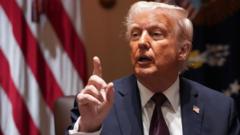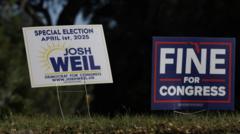Prime Minister Carney characterized the call with President Trump as "constructive" despite historical trade tensions, while Trump emphasized his respect for Canadian sovereignty despite previous jabs. Both leaders agreed to initiate talks on a new economic relationship post-Canadian elections, underlining escalating tariff conflicts.
Trump and Carney Discuss Canada-U.S. Relations Amid Tariff Threats

Trump and Carney Discuss Canada-U.S. Relations Amid Tariff Threats
In their inaugural conversation, Canadian Prime Minister Mark Carney and U.S. President Donald Trump navigated tensions from a looming trade war, with a promise for future negotiations.
The article text:
In a significant development for Canada-U.S. relations, Canadian Prime Minister Mark Carney revealed that President Donald Trump "respected Canada's sovereignty" during their first phone call. The conversation occurs against a backdrop of an ongoing trade war, coinciding with Carney's campaign ahead of the Canadian elections on April 28.
Trump has consistently floated the idea of Canada potentially becoming the 51st U.S. state, eliciting strong criticism from Canadians. However, following the call, Carney described their exchange as "very constructive", while Trump labeled it "extremely productive". With Trump’s 25% tariff on vehicle imports set to take effect on April 2, the potential impact on Canada's automotive sector is of major concern.
Typically, newly elected Canadian prime ministers prioritize establishing contact with their American counterparts, and the recent call marks the first formal discussion since Carney took office on March 14. The leaders have reportedly agreed to kick off comprehensive negotiations right after the elections.
The exchange highlighted a shift in Trump’s tone; historically, he has disparaged Carney's predecessor, Justin Trudeau. After the call, Trump stated, "I've always loved Canada," hinting at a desire for constructive dialogue moving forward. Nevertheless, tensions remain palpable as Canada has retaliated with tariffs on approximately C$60 billion worth of U.S. goods in response to U.S. duties on Canadian aluminum and steel.
Carney previously called the U.S. an "unreliable trading partner" and asserted that Canada must be ready to impose retaliatory tariffs with maximum impact. The Prime Minister reiterated this message in his call with Trump, hinting that more action could be taken if U.S. levies are put into effect.
The stakes are high, as Trump's proposed car tariffs are projected to threaten around 500,000 jobs in the Canadian automotive industry. Trump affirmed optimism about eventual resolutions, expressing, "I think things will work out very well between Canada and the United States."
Canadian opposition parties have reacted to the evolving diplomatic landscape, with Conservative leader Pierre Poilievre emphasizing the need to end "crazy tariff chaos" and suggesting that Trump favors a continuation of Liberal governance to reinforce his economic agenda. Bloc Québécois leader Yves-François Blanchet raised concerns regarding Carney's willingness to yield to U.S. pressures, while NDP leader Jagmeet Singh previously branded the tariffs as a "betrayal".
Trump has also cautioned Canada against collaborating with the European Union in response to upcoming U.S. tariffs, threatening "large-scale tariffs" should such cooperation be attempted. The enduring strain in U.S.-Canadian relations remains a pivotal topic in the current Canadian election cycle.
In a significant development for Canada-U.S. relations, Canadian Prime Minister Mark Carney revealed that President Donald Trump "respected Canada's sovereignty" during their first phone call. The conversation occurs against a backdrop of an ongoing trade war, coinciding with Carney's campaign ahead of the Canadian elections on April 28.
Trump has consistently floated the idea of Canada potentially becoming the 51st U.S. state, eliciting strong criticism from Canadians. However, following the call, Carney described their exchange as "very constructive", while Trump labeled it "extremely productive". With Trump’s 25% tariff on vehicle imports set to take effect on April 2, the potential impact on Canada's automotive sector is of major concern.
Typically, newly elected Canadian prime ministers prioritize establishing contact with their American counterparts, and the recent call marks the first formal discussion since Carney took office on March 14. The leaders have reportedly agreed to kick off comprehensive negotiations right after the elections.
The exchange highlighted a shift in Trump’s tone; historically, he has disparaged Carney's predecessor, Justin Trudeau. After the call, Trump stated, "I've always loved Canada," hinting at a desire for constructive dialogue moving forward. Nevertheless, tensions remain palpable as Canada has retaliated with tariffs on approximately C$60 billion worth of U.S. goods in response to U.S. duties on Canadian aluminum and steel.
Carney previously called the U.S. an "unreliable trading partner" and asserted that Canada must be ready to impose retaliatory tariffs with maximum impact. The Prime Minister reiterated this message in his call with Trump, hinting that more action could be taken if U.S. levies are put into effect.
The stakes are high, as Trump's proposed car tariffs are projected to threaten around 500,000 jobs in the Canadian automotive industry. Trump affirmed optimism about eventual resolutions, expressing, "I think things will work out very well between Canada and the United States."
Canadian opposition parties have reacted to the evolving diplomatic landscape, with Conservative leader Pierre Poilievre emphasizing the need to end "crazy tariff chaos" and suggesting that Trump favors a continuation of Liberal governance to reinforce his economic agenda. Bloc Québécois leader Yves-François Blanchet raised concerns regarding Carney's willingness to yield to U.S. pressures, while NDP leader Jagmeet Singh previously branded the tariffs as a "betrayal".
Trump has also cautioned Canada against collaborating with the European Union in response to upcoming U.S. tariffs, threatening "large-scale tariffs" should such cooperation be attempted. The enduring strain in U.S.-Canadian relations remains a pivotal topic in the current Canadian election cycle.






















